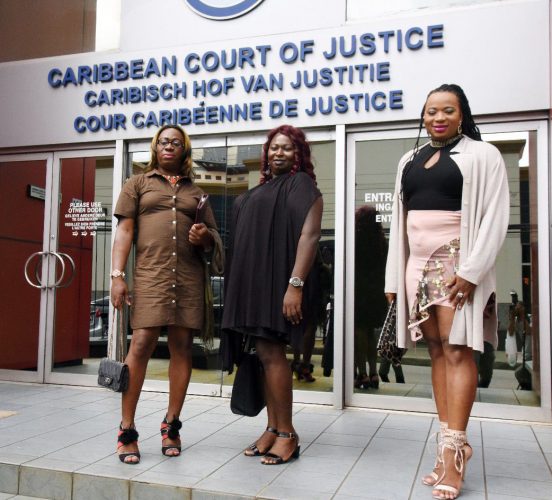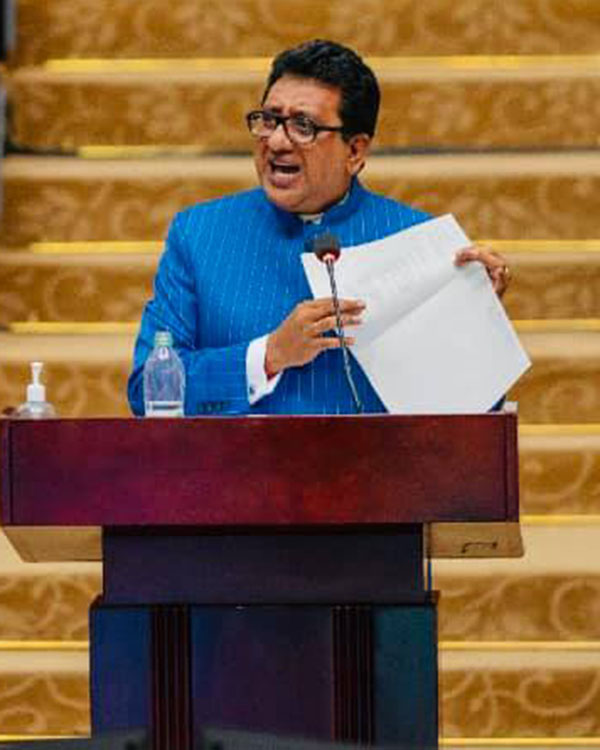Following hours of debate into the wee hours of yesterday morning, the National Assembly passed a bill to decriminalise cross-dressing, in keeping with a more that two-year-old Caribbean Court of Justice (CCJ) ruling.
The government used its majority in the House to pass the bill despite objections to it by some members of the main opposition coalition APNU+AFC, who argued that it was an affront to their Christian values.
However, Minister of Parliamentary Affairs and Governance Gail Teixeira was quick to caution that their personal religious beliefs had no place in the House.

An exception was APNU+AFC MP Khemraj Ramjattan, who signalled his support for the bill, but said that his support was to the extent that government also, in recognition and advancement of a person’s right to dress how he or she wishes, respects the right and wishes of persons who choose not to be vaccinated against COVID-19.
But Attorney General (AG) Anil Nandlall SC, by whom the bill was tabled, was quick to debunk the analogy drawn by Ramjattan between the right to cross-dress and the individual’s right to refuse vaccination as he pointed out that the exercise of the former causes harm to no one, while the exercise of the other has life and death consequences.
‘An obligation’
The bill, the Summary Jurisdiction (Offences) (Amendment) Bill 2021, removes Section 153 (1) (xlvii) of the Summary Jurisdiction (Offences) Act to comply with the Order issued by the CCJ back in November of 2018.
According to its explanatory memorandum, the bill amends Section 153 (1) of the Act by deleting paragraph (xlvii) which made it an offence for any person to appear in the attire of the opposite gender, in a public way or public place for any improper purpose. That particular provision was challenged by a group of Guyanese transgender women who contended that the law prohibiting cross-dressing was unconstitutionally vague and contravened their right to freedom of expression.
It is on account of that case—McEwan et al vs the Attorney General of Guyana [2018] CCJ 30 (AJ)—that the CCJ ruled that the law was unconstitutionally vague and was contrary to the rule of law. “The government rightly acknowledges and agrees with the CCJ that this archaic law, which is inconsistent with the Constitution of Guyana, has no social or legal purpose in a progressive society,” the bill’s explanatory memorandum states.
Nandlall, saying that government is committed to fulfilling the human rights of all Guyanese, noted that the Constitution is regarded as the supreme law and where it is found by the Courts that a particular law is inconsistent with the Constitution, that law can no longer be enforceable and would have to be vacated.
Quoting excerpts of the CCJ’s judgment, the AG told the House that the Court had found that the contentious provision violated the rights of equality and non-discrimination guaranteed by the Consti-tution and therefore had to be struck from the Act.
Having outlined the court’s ruling and the purpose of the Bill, Nandlall said that it was therefore the duty of the House “having been directed” by the court of last resort “to remove that repulsive provision from the laws.”
“That is an obligation that we have. It is a duty that devolves upon this House, having regard to the pronouncements made by our highest Court,” Nandlall said, while adding “and that is all that we are seeking to do here. We are doing nothing extraordinary. We are doing nothing controversial. We are doing nothing wrong, In fact, we are complying with our constitutional role,” he stressed.
He said that criticisms laid against the bill were not only against the liberal ethos sweeping the world, but were also futile because the government had the majority of the votes, and, more importantly, because the Court had already pronounced on and dispensed with the matter.
‘Dress appropriately’
Standing in unison with another colleague on the opposition side who also had to compete with heckles from the government benches, MP Annette Ferguson said that the amendment offended her Christian beliefs.
Fellow APNU+AFC MP Richard Sinclair argued that amendment was nothing short of a “sinful distortion of God’s gifts, while arguing that God had created only males and females to each “dress appropriately.”
After outlining their views against cross-dressing, much of the presentations from Ferguson and Sinclair focused on homosexuality and sodomy, which the CCJ’s ruling did not address. The Court dealt specifically with the issue of cross-dressing.
Registering her non-support for the bill, and like Sinclair referencing a plethora of biblical scriptures, Ferguson said that as a Christian she does not subscribe to the abandonment of social norms and morals on which society has been built.
Ferguson argued that “cross-dressing crosses the line of gender expression” “and sexual expression” as ordained by God, while adding that the amendment creates an environment which is “ripe for anarchy and lawlessness.”
She said the while citizens have a right to freedom of expression, there are limitations on those rights where they violate norms and values amounting to a transgression “of God’s laws which are supreme.”
To pass the bill, Ferguson argued, would be to invite into society “a higher level of deception and disorder.”
In a rebuttal, Nandlall later said that while one is entitled to those views in a democratic secular state as Guyana, “the Constitution says, civil liberties say, that those people [Transgender persons] are entitled to dress in that way,” and that all must nonetheless be able to peacefully coexist.
In her presentation, Teixeira was quick to reject the personal-religious belief arguments from Ferguson and Sinclair, who she said gave them “a lecture on the Bible.”
“But we are not bringing the Bible into law… we are dealing with a bill that brings us into compliance with the CCJ’s ruling on a rights issue,” the government Chief Whip said.
Echoing the sentiments of the AG, Teixeira said that the House has a duty to follow the Constitution where it speaks against discrimination in a secular state in which “all our religious beliefs have space and place.”
She added that in pronouncing on a legal matter in the House, religion should be left out, especially having regard to the fact that Guyana is religiously diverse with different beliefs.
She told the APNU+AFC members that they can garner support for their religious beliefs among parishioners of their respective congregations, but that that did not amount to what the laws of land provide for in now allowing cross-dressing.
‘Constructive coercion’
Meanwhile, to resounding applause from his colleagues on the opposition side, Ramjattan said that the ruling has underlying contemporary significance in the context of the COVID-19 pandemic in assessing the PPP/C government’s most recent move at forcing citizens through coercive means to be vaccinated against their will.
He described it as “constructive coercion into being vaccinated.”
Ramjattan told the House that the ruling of the CCJ has significance for contemporary times. “…Because if you would like to see persons whose rights must be upheld and we, being a law-governed state, we must not have constructive coercion into being vaccinated,” he said.
Vaccination against COVID-19 is not mandatory, although new restrictions on access to services by unvaccinated persons have raised concerns among the public about the violation of their rights.
Ramjattan said that like government’s recognition of a person’s right to be respected in deciding what to wear, there is also the fundamental underlying principle of freedom of choice and personal liberty that ought to be respected by the PPP/C government where persons have decided against being vaccinated.
He told the Speaker that it is hoped that the significance of that argument will reach the government, which has been taking steps to essentially force vaccination on citizens through coercive means.
“So, I at least will support it [the bill], to the extent that it is logically concluding that episode of where cross-dressing is an offence because it violates the human rights of the individual,” Ramjattan said to loud applause from his colleagues.
In his rebuttal, Nandlall thanked Ramjattan for his support of the bill but was quick to debunk the analogy drawn between cross-dressing and vaccination.
Stating that he could not see the connection, Nandlall said that “one has to do with life and death while the other is a difference that causes harm to no one.”
“So there is no basis Mr. Ramjattan for that comparison,” the AG declared.
In his presentation, APNU+AFC member Dineshwar Jaiprashad also acknowledged that the bill would inevitably be passed but stressed the need for education among the populace, which he said is a necessity for likely social ills connected therewith.
Following the debate, the bill was declared passed by Speaker of the House Manzoor Nadir.
In 2009, several trans women were arrested and convicted under the 1893 Summary Jurisdiction (Offences) Act of the offence of being a “man” appearing in “female attire” in public for an “improper purpose.” They spent three nights in police detention in Georgetown after their arrest for the minor crime.
In 2010, Quincy McEwan, known as Gulliver, Seon Clarke, known as Angel Clarke, Joseph Fraser, also known as Peaches Fraser, and Seyon Persaud, also known as Isabella Persaud brought an action challenging the constitutionality of the law and their treatment during the legal process. The High Court of Guyana held that cross-dressing in and of itself is not a crime, but disagreed that the law was discriminatory or disproportionately impacted Trans and gender non-conforming persons. This decision was appealed to the Guyana Court of Appeal, and finally to the CCJ.
Their main contention had been that the law, which prohibits cross-dressing “for an improper purpose,” was so vague that it does not define what constitutes an “improper purpose,” which ultimately leads to uncertainty.
The Court upheld the appeal on the basis that the law resulted in transgendered and gender nonconforming persons being treated unfavourably by criminalizing their gender expression and gender identity.
The Court said the while it is true that cross-dressing is practiced by persons of several types of sexual orientation, the law had a disproportionately adverse impact on transgender persons, “particularly those who identify with the female gender.”
Guyana’s Constitution provides for protection from discrimination.






